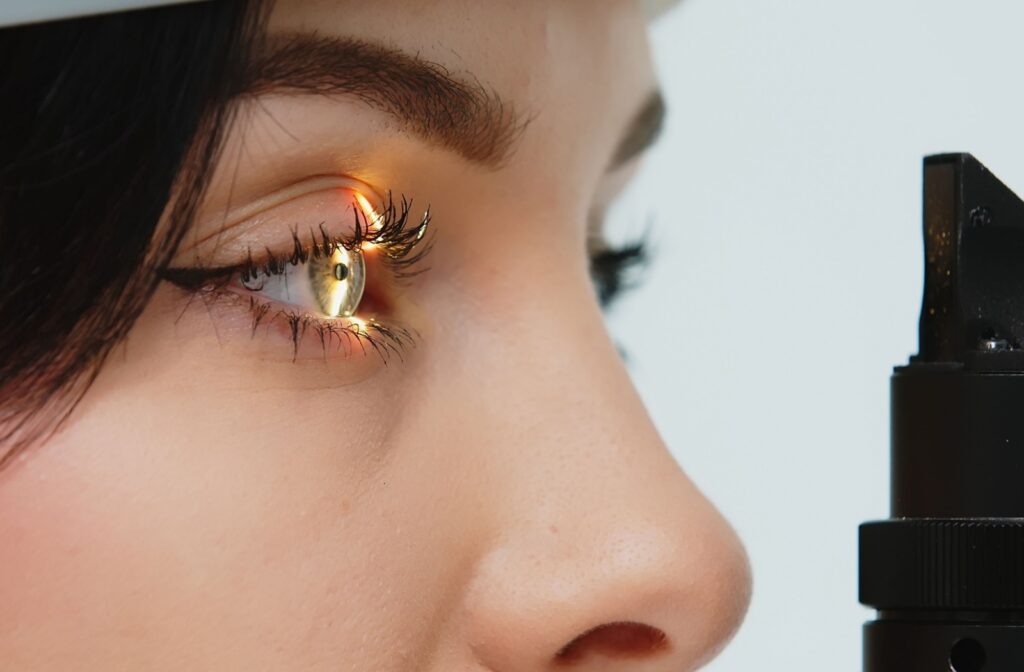Most people think of eye exams as a way to get a new glasses prescription or check their vision. But did you know that an eye exam can reveal much more than your ability to see clearly?
Your eyes are like windows to your health, and a routine visit to your optometrist could help uncover signs of serious health conditions.
From detecting early signs of systemic diseases like diabetes and high blood pressure, to identifying eye-specific conditions like glaucoma, eye exams are a crucial tool for safeguarding your vision and health.
The Health Insights in an Eye Exam
An eye exam is a way for your optometrist to examine the overall health of your eyes and even identify issues that may not cause noticeable symptoms in their early stages.
The retina, blood vessels, optic nerve, and other components of your eyes can reveal early indications of various conditions, offering a critical opportunity for timely intervention.
How Eye Exams Help Detect Hidden Health Conditions
During a comprehensive eye exam, your optometrist uses specialized tools to look deeply into your eyes. By examining the internal structures of the eye, like the retina, they can spot abnormalities that may signal hidden health concerns.
For instance, changes in the tiny blood vessels at the back of your eyes can indicate issues like:
- Diabetes
- High blood pressure
- High cholesterol
These findings might not only save your vision but could also lead to early treatments.
Eye Diseases Identified Through Routine Checkups
Several eye-specific diseases can be detected during a routine eye exam. These include:
- Glaucoma: Often called the “silent thief of sight,” glaucoma causes damage to the optic nerve and can lead to permanent vision loss without early symptoms.
- Cataracts: A clouding of the eye’s natural lens, cataracts are a leading cause of vision impairment but can be addressed effectively when diagnosed early.
- Macular Degeneration: This condition affects the central part of the retina and is a common cause of vision loss in older adults.
- Diabetic Retinopathy: A complication of diabetes, this disease damages the retina’s blood vessels and can result in blindness if left untreated.
Routine eye exams can help detect these conditions early, increasing the chances of successful intervention.
Systemic Diseases Your Optometrist Can Spot
Your eyes don’t just tell the story of your vision—they can also reflect what’s happening elsewhere in your body. Here are a few systemic health conditions that are often first discovered during an eye exam:
- Diabetes: Changes in the blood vessels of the retina can indicate high blood sugar levels, even if you haven’t yet been diagnosed with diabetes.
- Hypertension (High Blood Pressure): Swelling or narrowing of the retinal arteries might suggest chronic high blood pressure.
- High Cholesterol: Yellowish plaques in the eyes or fatty deposits around the cornea can be signs of high cholesterol.
- Autoimmune Diseases: Conditions like lupus or rheumatoid arthritis sometimes cause inflammation in the eyes.
A visit to your optometrist could be the first step in identifying a condition you might not even know you have.
Eye-Specific Conditions Revealed
Eye exams are important for detecting and managing eye-specific conditions as well. They can reveal issues beyond systemic diseases, such as:
- Dry Eye Syndrome: A condition where the eyes don’t produce enough tears, causing discomfort and irritation.
- Strabismus (Crossed Eyes): Where the eyes don’t align properly, potentially impacting vision development in children.
- Retinal Detachment: A serious condition that requires immediate medical attention to prevent vision loss.
These are just a few examples of what optometrists can identify, making regular eye exams key for anyone, regardless of age or visual acuity.
The Link Between Eye Health & Wellness
Your eyes are more closely linked to your overall health than you may realize. Enhancing your well-being can also promote better eye health. For instance:
- Eating a balanced diet rich in leafy greens, omega-3 fatty acids, and antioxidants supports both your eyesight and well-being.
- Regular exercise helps maintain healthy blood pressure and cholesterol levels, reducing risks to the eyes and body.
What to Expect During a Comprehensive Eye Exam
A comprehensive eye exam typically involves several steps:
- Medical History Review: Your optometrist will ask about your vision concerns and general health.
- Vision Tests: Eye charts are used to assess visual acuity.
- Retinal Exam: Using specialized tools, your optometrist will examine your eyes’ internal structures.
- Pressure Check: Glaucoma testing assesses eye pressure.
- Discussion: The optometrist will explain the findings and recommend any next steps.
Don’t be afraid to ask questions—it’s your health, and clear communication is key to your well-being.
Why Regular Eye Exams Are Vital for Your Health
Many health conditions, whether eye-specific or systemic, develop slowly and without obvious symptoms. Regular eye exams play a vital role in early detection and management, protecting both your vision and your health.
Whether you’ve noticed changes in your eyesight or not, an annual eye exam is one of the simplest ways to stay proactive about your health.
Protect Your Vision & Health with Early Detection
Your eyes are a window into your overall health. By scheduling regular eye exams, you’re taking a proactive step toward early disease detection, better vision, and improved well-being.
Don’t wait for symptoms to appear. Book your appointment with Vision Veritas Eyecare to ensure your eyes — and your health — get the attention they deserve.





